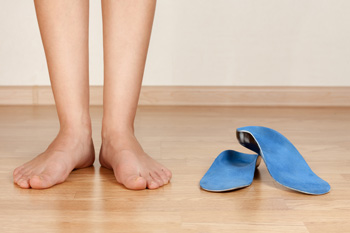
Orthotics play a key role in redistributing plantar pressure to relieve pain and prevent foot injuries. The material used in an orthotic insert can significantly impact how pressure is absorbed and spread across the foot. Softer materials, such as EVA, ethylene vinyl acetate, or gel, provide cushioning and shock absorption. These are often helpful for reducing pressure in sensitive areas, like the heel or ball of the foot. Firmer materials, such as polypropylene or carbon fiber, offer more support and control. These are commonly used to correct foot alignment and reduce excess pressure caused by abnormal gait or foot deformities. Some orthotics combine multiple materials to provide both cushioning and stability. Choosing the right orthotic material depends on individual foot needs, activity level, and specific conditions. If you experience foot pain or pressure points, it is suggested you see a podiatrist who can recommend the best orthotic design and materials to help distribute pressure more evenly and improve comfort.
If you are experiencing discomfort in your feet and would like to try custom orthotics, contact one of our podiatrists from Active Foot and Ankle Care, LLC. Our doctors can provide the care you need to keep you pain-free and on your feet.
What Are Custom Orthotics?
Custom orthotics are inserts you can place into your shoes to help with a variety of foot problems such as flat feet or foot pain. Orthotics provide relief and comfort for minor foot and heel pain.
Over-the-Counter Inserts
Shoe inserts come in a wide variety and are used to treat foot pain, heel pain, and minor problems. For example, arch supports can be inserted into your shoes to help correct overarched or flat feet, while gel insoles are often used because they provide comfort and relief from foot and heel pain by alleviating pressure.
Prescription Orthotics
If over-the-counter inserts don’t work for you or if you have a more severe foot concern, it is possible to have your podiatrist prescribe custom orthotics. These high-quality, custom inserts are designed to treat problems such as abnormal motion, plantar fasciitis, and severe forms of heel pain. They can even be used to help patients suffering from diabetes by treating foot ulcers and painful calluses and are usually molded to your feet individually, which allows them to provide full support and comfort.
If you're experiencing minor to severe foot or heel pain, it’s recommended to speak with your podiatrist about the possibility of using custom orthotics or shoe inserts. A podiatrist can determine which type of custom orthotic or shoe insert is right for you and help you take the first steps toward being pain-free.
If you have any questions please contact our offices located in Fair Lawn, Riverdale, and Englewood, NJ . We offer the newest diagnostic and treatment technologies for all your foot and ankle needs.






